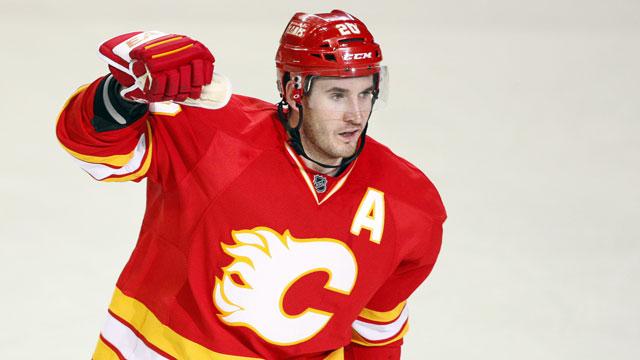Calgary Flames Free Agent Hits and Misses
Now, the BIGGEST Flames free agent signings are their own players. Getting Miikka Kiprusoff or Jarome Iginla to return to the team in their UFA seasons was huge. But that’s not really keeping with the spirit of this series. When you look back at players brought in, the pickings narrow. That’s true of most teams: stars rarely come available in free agency. And when they do, there are often reasons – obvious or otherwise. It’s much easier for general managers to make mistakes in a time as full of hope as the pre-season.
But out at the edges, there are some gems.
Best Signing: Curtis Glencross
Cheap is good. Cheap and useful is much, much better. In 2008, the Calgary Flames looked North and saw something they liked. Curtis Glencross had just finished up his 2007-2008 season with the Edmonton Oilers after getting traded there by the Columbus Blue Jackets. Exiled to the fourth line, he put up perfectly decent numbers.
Embed from Getty Images
Glencross was one of the top Corsi performers on an otherwise weak team, looking past the boxcars. But those boxcars were good! Nine goals and 13 points – all at even strength – in 26 games while averaging just over 10 minutes a night? Who wouldn’t want that? Edmonton didn’t, at least not at the $1.2 million for each of three seasons Calgary offered him. That doubled his paycheque and made signing an easy choice.
He remained a Flame for another seven seasons until agreeing to go to the Washington Capitals in pursuit of a Stanley Cup. His paycheque doubled again for his second deal with Calgary, but that first one was hard to beat. In those three years, Glencross played 220 games, scored 52 goals – six on the power-play and six shorthanded – and 116 points. His ice time went up considerably, but as a middle-six utility tool, $1.2 million per year is an awfully good deal.
#NHLTrade: Calgary #Flames have traded forward Curtis Glencross to the Washington #Capitals. http://t.co/AQPKRmGCEe pic.twitter.com/92NJUu4omq
— Sportsnet (@Sportsnet) March 1, 2015
Best Signing Honourable Mention: Chris Tanev
This would be the guy who doesn’t score any points, right? Right. Chris Tanev is the defenceman you put on the ice to calm things down. When he’s on the ice, shots go down – it’s simple math, and it helps his team win. Granted, taking him from a Vancouver Canucks team in financial straits was a risk, given his injury history. Four years at $4.5 million per season for a 30-year-old defenceman who never broke 20 points in a season? And managed to stay healthy for more than 70 games in any year?
Not only did Tanev play all of Calgary’s 138 regular-season games since his signing, but he also hit a career-high of six goals and 28 points in 2021-22. His even-strength Corsi rating was 54% while averaging 21 minutes of ice time. The bitter irony that after two seasons with perfect attendance he is taken out for months isn’t lost on us. But on a team loaded with offensive talent on the blue line, Tanev is the Responsible Dad that lets the kids play.
The Flames’ defence is very, very good. But they are looking forward to Tanev’s return before the New Year.
Worst Signing: Troy Brouwer
Flames sign Troy Brouwer to four-year, $18M deal. MORE: https://t.co/24yQLZAB50 pic.twitter.com/u3EKAxkvfY
— TSN (@TSN_Sports) July 1, 2016
In a heavily-contested category, Troy Brouwer edges out the competition for the end of his tenure. He was wearing an “A” when Brouwer got waived and eventually bought out in 2018. Despite his full no-trade clause becoming a modified one, the team couldn’t find a buyer. Brouwer was two years into a four-year, $18 million deal, and his reputation as an agitating middle-six winger who would get you 20 goals was in tatters.
Embed from Getty Images
Brouwer had made his name in the Chicago Blackhawks’ 2009-10 Stanley Cup win as someone who produced with minimal ice time and drove opponents up the wall. He built his career from there, adding value to the Washington Capitals and St. Louis Blues before Calgary bid on his services. Unfortunately, when he got to Alberta his scoring was on another flight. His two seasons there were decidedly mediocre, dropping to the fourth line by his second year. His 19 goals and 47 points in 150 games were bad enough, but his defence also failed him. In 2018 the team decided to pay Brouwer $6 million over four seasons to not play for them.
Worst Signing Honourable Mention: James Neal
Easy go, easy come as 2018 saw the release of Troy Brouwer and the signing of James Neal. The Real Deal James Neal came to Calgary with great fanfare, and for good reason. He was a rock-solid offensive performer, never scoring fewer than 21 goals in any of his 10 NHL seasons. The 6’3″ 210-pound Neal would give the Flames a veteran scorer to join Johhny Gaudreau, Sean Monahan, and Matthew Tkachuk.
Yeah, they signed him for a lot of money over five years. And sure, he’s 31 years old at the start of the deal. And, okay, he’s showing signs of wear and was never the most injury-free guy. He’s also not the fastest player, which won’t improve as he ages. But he, uh… Hm. The odds of him being among the best Flames free agent signings were remote. But if he could contribute some leadership with moderate numbers, he could boost the team in other ways. Classic “good in the room” arguments you’ll hear from teams signing veterans.
As it ended up, the team didn’t need to buy him a uniform – they could just put a number on all those red flags. Neal couldn’t find a comfortable home with his new team. His lack of foot speed left him far behind his linemates. Injuries limited him to 63 regular season games, and he contributed nothing in four playoff games. Not only did Neal not hit 20 goals for the first time in his career, he only managed 19 points.
The biggest reason why Neal lost the top spot to Brouwer is that Brouwer provided nothing when he left. Neal, at least, brought back Milan Lucic and a third-round pick from Edmonton. As an added bonus, the Oilers paid some retained salary from Lucic AND are giving Neal almost $2 million for the next three seasons. And anything that hurts Edmonton makes the dreadful signing of James Neal go down just a little bit easier.






